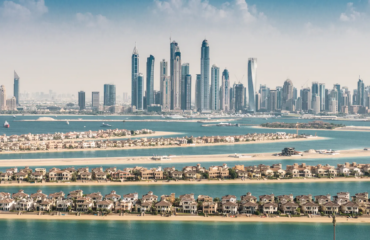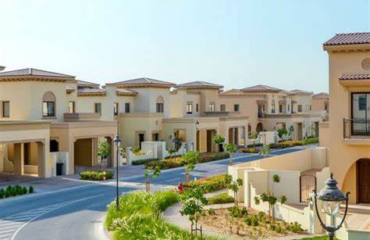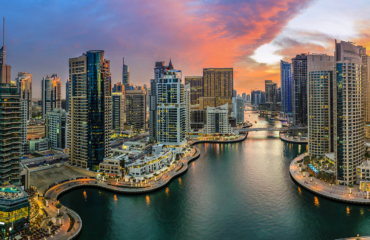
Did you know that Dubai’s property market offers rental yields among the highest in the world, averaging between 5% and 8%? With such impressive returns, deciding whether to rent or buy property isn’t just about where you’ll live—it’s about making a smart financial choice.
For some, renting offers flexibility and lower upfront costs. For others, buying a property means stability, long-term investment, and a place to truly call home. So, should I buy property in Dubai, or is renting the better option?
In this blog, we’ll break down the pros, cons, and key factors to help you make the right choice based on your goals and lifestyle.
Content Highlights
- Understanding the Dubai property market
- Pros and cons of renting property in Dubai
- Pros and cons of buying property in Dubai
- Key financial considerations – rent vs buy property in Dubai
- Who should rent property in Dubai?
- Who should buy property in Dubai?
- Emotional factors – renting vs buying property in Dubai
- Final thoughts – should I buy or rent property in Dubai
- FAQs about renting vs buying property in Dubai
Understanding the Dubai property market
Dubai’s property market is one of the most dynamic in the world, attracting investors, homeowners, and renters from across the globe. With its modern infrastructure, tax-free income, and investor-friendly policies, the city continues to offer promising opportunities for both renting and buying property.
Key trends in the Dubai property market
- Strong rental yields: Dubai consistently delivers some of the highest rental yields globally, averaging between 6% and 8% in prime areas.
- Population growth: Dubai’s population is expected to surpass 4 million by 2026, increasing demand for both rental and owned properties.
- Government initiatives: Policies like long-term residency visas and foreign ownership rights in designated freehold areas have made property ownership more appealing.
What makes Dubai’s property market unique?
- Diverse property options: From luxury villas in gated communities to stylish apartments in urban hubs, there’s something for every lifestyle.
- Tax advantages: There are no property taxes or capital gains taxes, making ownership especially appealing to long-term investors.
- Resilient market performance: Despite global economic shifts, Dubai’s property market has shown resilience, with consistent growth in both sales and rental sectors.
What does this mean for you?
Whether you’re considering short-term flexibility or long-term investment, understanding these trends can guide your decision to rent or buy property. The key is aligning your financial goals with the unique opportunities Dubai offers.
In the next sections, we’ll explore the pros and cons of renting and buying, so you can decide if now is the right time to buy property in Dubai or continue renting.
Pros and cons of renting property in Dubai
Deciding whether to rent or buy property in Dubai often comes down to understanding the advantages and challenges of each option. Renting offers flexibility and convenience, but it also has its limitations. Below, we’ll break down the key pros and cons of renting property in Dubai to help you make an informed choice.
Advantages of renting property in Dubai
- Flexibility and mobility: Renting allows you to move easily if your circumstances or preferences change. This is particularly beneficial for those with short-term plans in the city or frequent job relocations.
- Lower upfront costs: Renting typically requires a smaller initial financial commitment compared to buying a property. You’ll need a security deposit and a few months’ rent upfront, but that’s much less than a mortgage deposit and associated buying fees.
- Access to prime locations: Renting often makes it more affordable to live in desirable areas where purchasing might be out of budget, such as Downtown Dubai or Dubai Marina.
- Maintenance responsibility: In most rental agreements, the landlord is responsible for major property maintenance and repairs, saving you time and money.
Disadvantages of renting property in Dubai
- Rising rental costs: Rental prices in Dubai can fluctuate based on market conditions, and annual increases can impact your financial planning.
- No long-term investment value: Unlike buying, renting doesn’t build equity or offer a return on investment over time.
- Limited personalisation: Renters often face restrictions on making significant changes to the property, limiting the ability to truly make the space feel like home.
- Lease dependency: Rental agreements are tied to lease terms, and there’s always the possibility of not being able to renew or facing changes in rental conditions.
Is renting property right for you?
If you value flexibility, have short-term plans in Dubai, or prefer to avoid the long-term financial commitment of a mortgage, renting might be the better choice. However, it’s essential to weigh these factors against your long-term financial and lifestyle goals.
Next, we’ll explore the benefits and challenges of buying property in Dubai to give you a balanced perspective on the rent or buy property debate.
Pros and cons of buying property in Dubai
Buying a home is often seen as a significant milestone, both financially and emotionally. In Dubai, property ownership offers unique benefits, but it also comes with responsibilities and risks. Let’s break down the key pros and cons of buying property in Dubai to help you decide if it’s the right choice for you.
Advantages of buying property in Dubai
- Long-term investment benefits: Owning property allows you to build equity over time, offering financial security and potential returns if property values rise.
- Stability and ownership security: Unlike renting, owning a property ensures you won’t face sudden rent increases or eviction notices, giving you long-term peace of mind.
- Potential rental income: Many property owners in Dubai earn significant income by renting out their homes, thanks to strong rental yields averaging between 6% and 8%.
- Residency visas: Buying property in Dubai can make you eligible for long-term residency visas, depending on the value of the property you purchase.
- Personalisation: Homeowners have the freedom to customise their space, from renovations to interior design, without restrictions.
Disadvantages of buying property in Dubai
- High upfront costs: Purchasing a property in Dubai requires a significant initial investment, including a deposit, registration fees, and other related costs.
- Ongoing maintenance expenses: As a homeowner, you’ll be responsible for regular maintenance, service charges, and any unexpected repairs.
- Market fluctuations: Property values can change based on market conditions, which might affect the resale value of your investment.
- Long-term financial commitment: Mortgages require consistent payments over an extended period, which may limit your financial flexibility.
Is buying property right for you?
If you plan to stay in Dubai for the long term, are financially stable, and see property as an investment opportunity, buying could be the smarter choice. It’s not just about owning a home—it’s about building wealth and securing your future.
In the next section, we’ll compare the financial factors of renting vs buying property in Dubai, helping you understand the cost implications of each option.
Key financial considerations – rent vs buy property in Dubai
When deciding whether to rent or buy property in Dubai, finances play a significant role. While renting may seem more affordable in the short term, buying offers long-term financial benefits. In this section, we’ll break down the financial aspects of both options to help you make an informed decision.
Upfront costs: renting vs buying property
- Renting: Typically, renters need to pay a security deposit (usually 5% of the annual rent) and the rent for multiple months in advance. Agency fees and other minor costs may also apply.
- Buying: Purchasing property in Dubai involves higher upfront costs, including:
- Mortgage deposit: Usually 20–25% of the property value for expatriates.
- Property registration fees: 4% of the property value, payable to the Dubai Land Department (DLD).
- Agent commission: Typically 2% of the property value.
- Mortgage arrangement fees: Around 1% of the loan amount.
While the initial costs of buying are significantly higher, they contribute to an asset you own, whereas rental payments do not.
Monthly expenses: renting vs buying property
- Renting: Monthly or annual rent payments are fixed for the duration of the lease, but prices can rise during renewal based on market conditions.
- Buying: Monthly mortgage payments may initially be higher than rental payments, but they remain consistent for the loan term. Once the mortgage is paid off, housing costs reduce significantly.
Additional costs to consider for renters and buyers
- For renters: Utility bills, maintenance (usually minor), and chiller fees (in some apartments).
- For buyers: Service charges, annual maintenance costs, insurance premiums, and ongoing property taxes (if applicable in certain zones).
Financial tools to compare costs
If you’re still uncertain, online tools like this rent vs buy calculator can help estimate which option makes more financial sense based on your situation. These tools consider factors like rental prices, mortgage payments, and property appreciation.
Investment potential
- Renting: No return on your payments; money is spent on temporary housing.
- Buying: Property values in Dubai often appreciate over time, and owners can generate passive income through rental returns.
Which option is more cost-effective? Short term stay or Long term stay?
- Short-term stay (less than 3–5 years): Renting is generally more cost-effective due to lower upfront costs.
- Long-term stay (5 years or more): Buying becomes more financially rewarding as mortgage payments build equity and ownership over time.
Next, we’ll explore the type of individuals who might benefit more from renting versus those who are better suited to buying property in Dubai.
Who should rent property in Dubai?
Deciding whether to rent or buy property in Dubai isn’t just about numbers—it’s also about your lifestyle, future plans, and personal preferences. Renting can be the ideal choice for certain situations, offering flexibility and lower upfront costs. Here are the key scenarios where renting might be the better option for you.
1. Short-term residents
If you’re planning to stay in Dubai for less than three to five years, renting is often the more practical choice. The upfront costs of buying a property, including deposits and registration fees, may not make financial sense for a short stay.
2. Career-driven individuals
For those whose jobs may require frequent relocation or those unsure about their long-term plans in Dubai, renting offers the flexibility to move easily without being tied down to a mortgage.
3. Limited upfront budget
Buying property requires a substantial initial investment, including a deposit, registration fees, and other charges. If you’re not ready to commit a significant amount of money upfront, renting allows you to secure a home with relatively lower financial strain.
4. Desire for flexibility
Renting provides the freedom to move between neighbourhoods, upgrade or downsize homes, and respond to life changes more easily. This is especially useful if you’re still exploring different areas of Dubai or if your housing needs might change in the near future.
5. Preference for premium locations
Certain high-demand areas in Dubai, such as Downtown Dubai or Palm Jumeirah, might be more affordable to rent than to buy. If living in a prime location is important to you, renting may provide access to premium properties without the long-term financial commitment of ownership.
6. Uncertain market conditions
If you’re unsure about the current state of the real estate market or feel it might fluctuate, renting gives you the flexibility to wait and observe before making a significant investment.
Is renting the right choice for you?
Renting property in Dubai works well for those who value flexibility, lower upfront costs, and the ability to adapt quickly to changing circumstances. However, if you’re planning to stay long-term or are financially ready for a larger commitment, buying might offer more value.
In the next section, we’ll explore the scenarios where buying property in Dubai becomes the smarter choice.
Who should buy property in Dubai?
While renting offers flexibility, buying property in Dubai provides stability, long-term financial benefits, and a sense of ownership. For many people, owning a home isn’t just an investment—it’s a milestone. Below are the key scenarios where buying property in Dubai makes more sense than renting.
1. Long-term residents
If you plan to stay in Dubai for five years or more, buying property often becomes more financially rewarding than renting. Instead of paying rent, your monthly mortgage payments build equity in an asset that you own.
2. Financial stability
Buying property requires a significant upfront investment and ongoing costs. If you have a stable income, savings for a deposit, and a long-term financial plan, property ownership can be a smart decision.
3. Investors seeking rental income
Dubai’s property market is known for strong rental yields, averaging between 6% and 8% in prime areas. If you’re looking for a reliable source of passive income, buying property to lease out can offer excellent returns.
4. Families looking for permanence
For families planning to settle down in Dubai, buying property provides long-term security and stability. Owning a home means no rent hikes, no lease renewals, and the freedom to personalise your space without landlord restrictions.
5. Eligibility for residency visas
Property ownership in Dubai can qualify you for long-term residency visas, such as the 10-year Golden Visa, depending on the value of the property you purchase. This added benefit makes buying property even more appealing for expatriates.
6. Desire for customisation and personalisation
Homeowners have the freedom to modify and personalise their properties. Whether it’s renovations, interior design changes, or adding new features, owning a home allows you to make it truly yours.
7. Long-term investment mindset
Real estate in Dubai has historically shown strong capital appreciation, especially in well-developed areas. Buying property isn’t just about having a home—it’s also about building long-term wealth. Speak to our expert real estate developers in dubai for more information.
Is buying the right choice for you?
If you’re financially prepared, planning to stay long-term, or aiming to earn rental income, buying property in Dubai can be a highly rewarding decision. It’s not just about where you live—it’s about creating financial stability and securing a valuable asset.
In the next section, we’ll dive into the emotional factors that often influence the decision to rent or buy property in Dubai.
Emotional factors – renting vs buying property in Dubai
When deciding whether to rent or buy property in Dubai, the emotional side of the choice is just as important as the financial one. A home is more than just a financial asset or a temporary space—it’s where life happens. Below, we’ll explore the emotional aspects tied to both renting and buying a home.
1. The emotional satisfaction of owning a home
Owning property often comes with a deep sense of pride and accomplishment. Your home is not just an asset; it’s a reflection of your hard work and a space where you can create lasting memories. There’s a unique emotional comfort in knowing that no landlord can ask you to vacate or raise the rent unexpectedly.
2. The freedom to make a house your own
For homeowners, the ability to personalise a property is a key emotional factor. Whether it’s redesigning a kitchen, repainting walls, or landscaping a garden, owning a home gives you complete creative control. Renters, on the other hand, are often restricted by tenancy agreements when it comes to major changes.
3. Stability vs flexibility
- Buying: Homeownership brings a sense of long-term stability. Families, in particular, benefit from having a permanent base where children can grow up without the uncertainty of having to relocate.
- Renting: For those who value flexibility and the freedom to move when opportunities arise, renting offers emotional ease and less attachment to one place.
4. The stress of financial responsibility
While buying property brings emotional satisfaction, it also comes with financial responsibility. Mortgage payments, maintenance costs, and service charges can add emotional pressure. Renters, on the other hand, often enjoy the peace of mind that comes from not being tied to long-term financial commitments.
5. The emotional weight of ‘temporary’ vs ‘permanent’ living
- Renting: Renters often view their homes as temporary spaces, which can create a sense of impermanence. This feeling may impact the emotional connection they build with their living space.
- Buying: Homeowners tend to feel more rooted and invested in their communities, which contributes to an overall sense of belonging.
6. A mindset shift – renter vs homeowner
Renters often prioritise flexibility and short-term financial convenience, while homeowners focus on long-term value and security. Neither mindset is wrong—it’s about understanding your priorities and what brings you peace of mind.
Which emotional experience fits your lifestyle?
If you value stability, long-term ownership, and the emotional satisfaction of having a place to call your own, buying property might be the right choice. However, if you cherish flexibility, minimal long-term financial responsibility, and the freedom to move when needed, renting could better suit your needs.
Final thoughts – should I buy or rent property in Dubai?
Deciding whether to rent or buy property in Dubai comes down to your plans, finances, and lifestyle goals. Renting offers flexibility and lower upfront costs, while buying provides long-term stability, investment opportunities, and a place to truly call home.
At Grovy, we specialise in creating thoughtfully designed properties that combine comfort, style, and lasting value. Whether you’re ready to invest in your dream home or exploring your options, our team is here to guide you every step of the way.
Start your journey with Grovy today and find the property that fits your future.
FAQs about renting vs buying property in Dubai
1. Is it cheaper to rent or buy property in Dubai?
In the short term, renting is usually more affordable due to lower upfront costs. However, buying becomes more cost-effective over time, especially if you plan to stay in Dubai for more than five years.
2. Can foreigners buy property in Dubai?
Yes, expatriates can buy property in designated freehold areas. Property ownership also comes with added benefits, like eligibility for long-term residency visas.
3. What are the upfront costs of buying property in Dubai?
Upfront costs include a 20–25% mortgage deposit, a 4% Dubai Land Department fee, agent commission (around 2%), and mortgage arrangement fees (approximately 1%).
4. What are the benefits of buying property over renting in Dubai?
Buying offers long-term financial benefits, stability, potential rental income, and the freedom to customise your property.
5. What are the risks of buying property in Dubai?
Market fluctuations, ongoing maintenance costs, and financial commitment over time are the key risks. However, buying from a reputable developer reduces these concerns.
6. Are there tools to compare renting vs buying in Dubai?
Yes, online tools like Bayut’s rent vs buy calculator can help you compare costs and make an informed decision based on your situation.
7. What factors should I consider when deciding to rent or buy?
Evaluate your financial stability, long-term plans, market conditions, and lifestyle preferences before making a decision.








